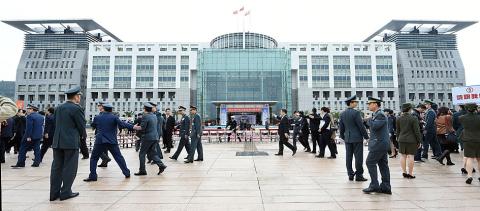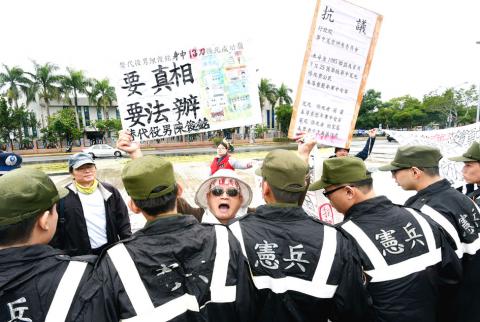The new Ministry of National Defense headquarters complex was officially opened yesterday in Taipei’s Dazhi area (大直), touted by senior military figures and government officials as having state-of-the-art security installations and adopting a “green building concept.”
The main building consists of eight floors, along with several annex buildings. Construction started in 1996, and has taken 18 years to complete, as the project was delayed due to several problems and legal wrangling.
In his address, Minister of National Defense Yen Ming (嚴明), who presided over the opening ceremony yesterday, said the complex represents “a new milestone,” and from now on the Dazhi area with the relocated ministry and armed forces headquarters has become the “new Boai Military District” (博愛營區).

Photo: Chang Chia-ming, Taipei Times
Ministry of National Defense Armaments Bureau section head Huang Te-hsiao (黃德孝) said the new complex incorporates “green building concepts” with environmentally friendly, energy-saving designs.
“The new buildings have rainwater harvesting facilities. Up to 1,000 tonnes of rainwater can be stored on site. There are also wastewater treatment and filtering systems,” said Huang, whose section was in charge of constructing the water system.
He added that by using aluminum and other materials in the exterior glass-wall design, “we are able to reduce thermal heating from direct sunlight by blocking out most infrared and low-frequency radiation.”

Photo: Chang Chia-ming, Taipei Times
Huang also praised the state-of-the-art security system and safety measures of the new complex, calling them “more advanced and powerful than those of the Pentagon,” without elaborating.
He said all personnel and vehicles entering and exiting the ministry buildings must go through security checkpoints, at which their identification cards are verified against photographs and a biometric identification system.
“Each individual and vehicle must have a file on the security database. The digital informatics system can verify their identity within seconds,” Huang said. “On high-security floors, individuals are checked with fingerprint and eye scanners.”
After numerous delays to the project, some legislators and public officials were severely critical of budget overruns, which ballooned to NT$15.8 billion (US$497.65 million).
Although President Ma Ying-jeou (馬英九) was invited to the opening ceremony, he did not attend.
According to media reports, Ma did not attend because votes by military personnel and their dependents failed to materialize for the Chinese Nationalist Party’s (KMT) candidates in last month’s nine-in-one elections.
Meanwhile, family members of several soldiers who died during their service in the military protested outside the new compound, demanding more transparency in investigations into physical abuse in the military.
Carrying portraits of deceased soldiers, protesting parents and their supporters decried what they said was the military’s disregard for human rights.
The protest was led by the parents of four soldiers who died while serving, which included conscripts for mandatory service, as well as voluntary servicemen.
Members of the Taiwan National Party also showed their support.
Yu Jui-ming (尤瑞敏), the mother of Tsai Hsueh-liang (蔡學良), an air force staff sergeant who died during target practice in 2008, said the military has not revealed the truth.
While military investigators said that Tsai committed suicide, Yu said their report contradicts case evidence.
She staged a hunger strike in May, urging a ballistics test.
“Taiwan is not at war right now; nobody’s son should die in the military,” Yu said. “I do not understand how the ministry has the nerve to spend so much taxpayer money on this new ‘palace.’”
“Each death is like a brick. When you stack them up together, they will be much stronger than the walls of this compound,” Lin Ming-i’s (林明逸) father said, adding that his son died from military hospital malpractice in 2002.
Parents of dead soldiers are demanding answers, Lin’s father said.
“It is very difficult for the parents, but we will no longer sulk in the shadows. More are joining our search for the truth,” he added.
Family members of army sergeant Lien Chih-wei (連志偉) and substitute civilian serviceman Chen Chun-ming (陳俊銘), who passed away in 2005 and 2012 respectively, also attended the protest.
Ministry statistics last year showed that 2,088 men and women died in service between 2000 and 2012, although parents say the number is much higher.

MAKING WAVES: China’s maritime militia could become a nontraditional threat in war, clogging up shipping lanes to prevent US or Japanese intervention, a report said About 1,900 Chinese ships flying flags of convenience and fishing vessels that participated in China’s military exercises around Taiwan last month and in January last year have been listed for monitoring, Coast Guard Administration (CGA) Deputy Director-General Hsieh Ching-chin (謝慶欽) said yesterday. Following amendments to the Commercial Port Act (商港法) and the Law of Ships (船舶法) last month, the CGA can designate possible berthing areas or deny ports of call for vessels suspected of loitering around areas where undersea cables can be accessed, Oceans Affairs Council Minister Kuan Bi-ling (管碧玲) said. The list of suspected ships, originally 300, had risen to about

DAREDEVIL: Honnold said it had always been a dream of his to climb Taipei 101, while a Netflix producer said the skyscraper was ‘a real icon of this country’ US climber Alex Honnold yesterday took on Taiwan’s tallest building, becoming the first person to scale Taipei 101 without a rope, harness or safety net. Hundreds of spectators gathered at the base of the 101-story skyscraper to watch Honnold, 40, embark on his daredevil feat, which was also broadcast live on Netflix. Dressed in a red T-shirt and yellow custom-made climbing shoes, Honnold swiftly moved up the southeast face of the glass and steel building. At one point, he stepped onto a platform midway up to wave down at fans and onlookers who were taking photos. People watching from inside

Japan’s strategic alliance with the US would collapse if Tokyo were to turn away from a conflict in Taiwan, Japanese Prime Minister Sanae Takaichi said yesterday, but distanced herself from previous comments that suggested a possible military response in such an event. Takaichi expressed her latest views on a nationally broadcast TV program late on Monday, where an opposition party leader criticized her for igniting tensions with China with the earlier remarks. Ties between Japan and China have sunk to the worst level in years after Takaichi said in November that a hypothetical Chinese attack on Taiwan could bring about a Japanese

The WHO ignored early COVID-19 warnings from Taiwan, US Deputy Secretary of Health and Human Services Jim O’Neill said on Friday, as part of justification for Washington withdrawing from the global health body. US Secretary of State Marco Rubio on Thursday said that the US was pulling out of the UN agency, as it failed to fulfill its responsibilities during the COVID-19 pandemic. The WHO “ignored early COVID warnings from Taiwan in 2019 by pretending Taiwan did not exist, O’Neill wrote on X on Friday, Taiwan time. “It ignored rigorous science and promoted lockdowns.” The US will “continue international coordination on infectious